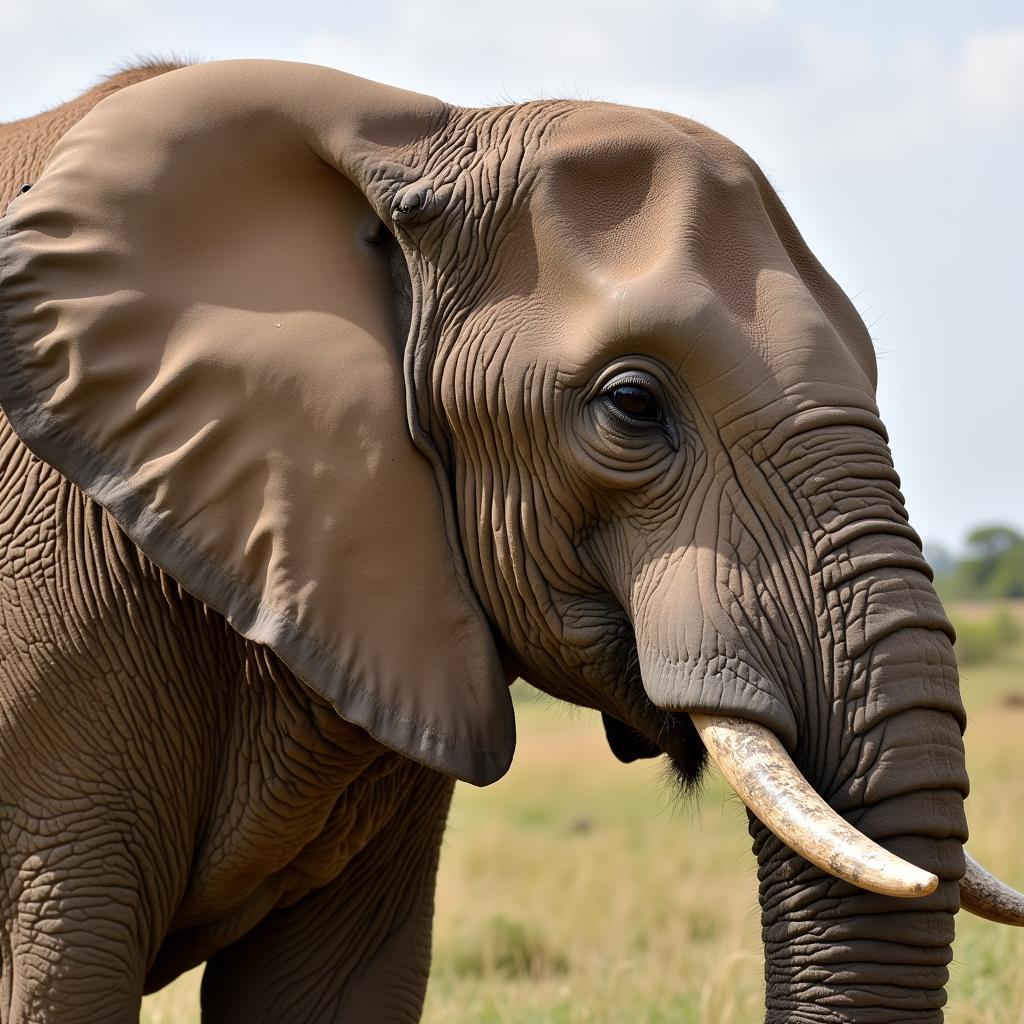African Elephant Without Ears: Myth or Reality?
The idea of an “African Elephant Without Ears” might conjure up images of mythical creatures or genetic anomalies. While the image itself is certainly striking, it’s crucial to understand that a true African elephant without ears is impossible. Ears are essential for an elephant’s survival, playing a vital role in their daily lives.
 African elephant with large ears flapping
African elephant with large ears flapping
Why Ears Are Crucial for African Elephants
African elephants, both the savanna and forest subspecies, are renowned for their massive size and, most notably, their enormous ears. These ears aren’t just for show; they serve a critical purpose:
- Thermoregulation: The African savanna, in particular, can experience scorching temperatures. An elephant’s ears, rich with blood vessels, act like giant radiators. By flapping their ears, they create air currents that help dissipate heat and cool their bodies, much like a natural fan.
- Communication: Elephants use a variety of vocalizations and body language to communicate. Their ears play a significant role in amplifying these sounds, especially low-frequency rumbles that can travel for miles across the savanna.
- Hearing: While their ears might seem oversized, their actual ear canals are relatively small. However, the large surface area of their ears helps funnel sound waves towards these canals, enhancing their hearing. This is particularly important for detecting the calls of other elephants and potential threats in their environment.
Debunking the Myth: Can Elephants Lose Their Ears?
While a completely earless African elephant is purely fictional, there are instances where elephants might have damaged or partially missing ears:
- Injury: Elephants can sustain injuries in the wild, potentially from fights with other elephants, attacks from predators like lions, or encounters with humans. These injuries might result in tears or chunks missing from their ears.
- Poaching: Tragically, poaching poses a severe threat to African elephants. Poachers often target elephants for their ivory tusks, and in some cases, the brutality might extend to mutilating the ears as well.
 An injured elephant with a torn ear.
An injured elephant with a torn ear.
The Importance of Protecting African Elephants
Seeing an elephant with a damaged ear serves as a stark reminder of the dangers they face. It’s crucial that we intensify our efforts in:
- Combating Poaching: Strengthen anti-poaching patrols, implement stricter laws against the ivory trade, and raise awareness about the devastating impact of poaching on elephant populations.
- Mitigating Human-Wildlife Conflict: As human populations expand, encounters with elephants become more frequent. Finding ways to coexist peacefully, such as creating wildlife corridors and promoting responsible land management practices, is essential.
- Supporting Conservation Efforts: Supporting organizations dedicated to elephant research, habitat protection, and community outreach is crucial in ensuring the long-term survival of these magnificent animals.
The African Elephant’s Story is Our Story
The plight of the African elephant, even the mythical image of one without ears, is a powerful reminder of our interconnectedness with the natural world. By understanding the vital role ears play in an elephant’s life, we gain a deeper appreciation for these animals and the importance of safeguarding their future.
Let’s work together to ensure that future generations can marvel at the sight of African elephants, ears and all, roaming freely in their natural habitats.
Do you want to learn more about the fascinating world of African desert biome animals? Explore our other articles to discover the diverse creatures that call Africa home!
FAQs about African Elephants and Their Ears
1. Can an elephant survive without ears?
No, an elephant cannot survive without ears. Their ears are essential for regulating body temperature, communicating, and hearing.
2. Why do African desert animals list have such large ears?
Larger ears provide a greater surface area for dissipating heat, which is crucial for survival in hot, arid environments like the African savanna.
3. How do elephant ears help them communicate?
Elephant ears act like amplifiers, helping to project their low-frequency rumbles over long distances.
4. What are some threats to African habitats and animals?
Habitat loss due to deforestation, human encroachment, climate change, and poaching are some of the most significant threats to African habitats and their wildlife.
5. What can I do to help protect African elephants?
You can support reputable conservation organizations, raise awareness about elephant conservation, and advocate for policies that protect elephants and their habitats.
Still have questions about the “African Elephant Without Ears” myth?
Here are some other topics you might find interesting:
- The fascinating world of African elephant predators
- The deadly African black mamba snake and its role in the ecosystem
For further assistance or inquiries, please don’t hesitate to contact our team:
Phone: +255768904061
Email: [email protected]
Address: Mbarali DC Mawindi, Kangaga, Tanzania.
We’re available 24/7 to address your concerns and provide the information you need.


